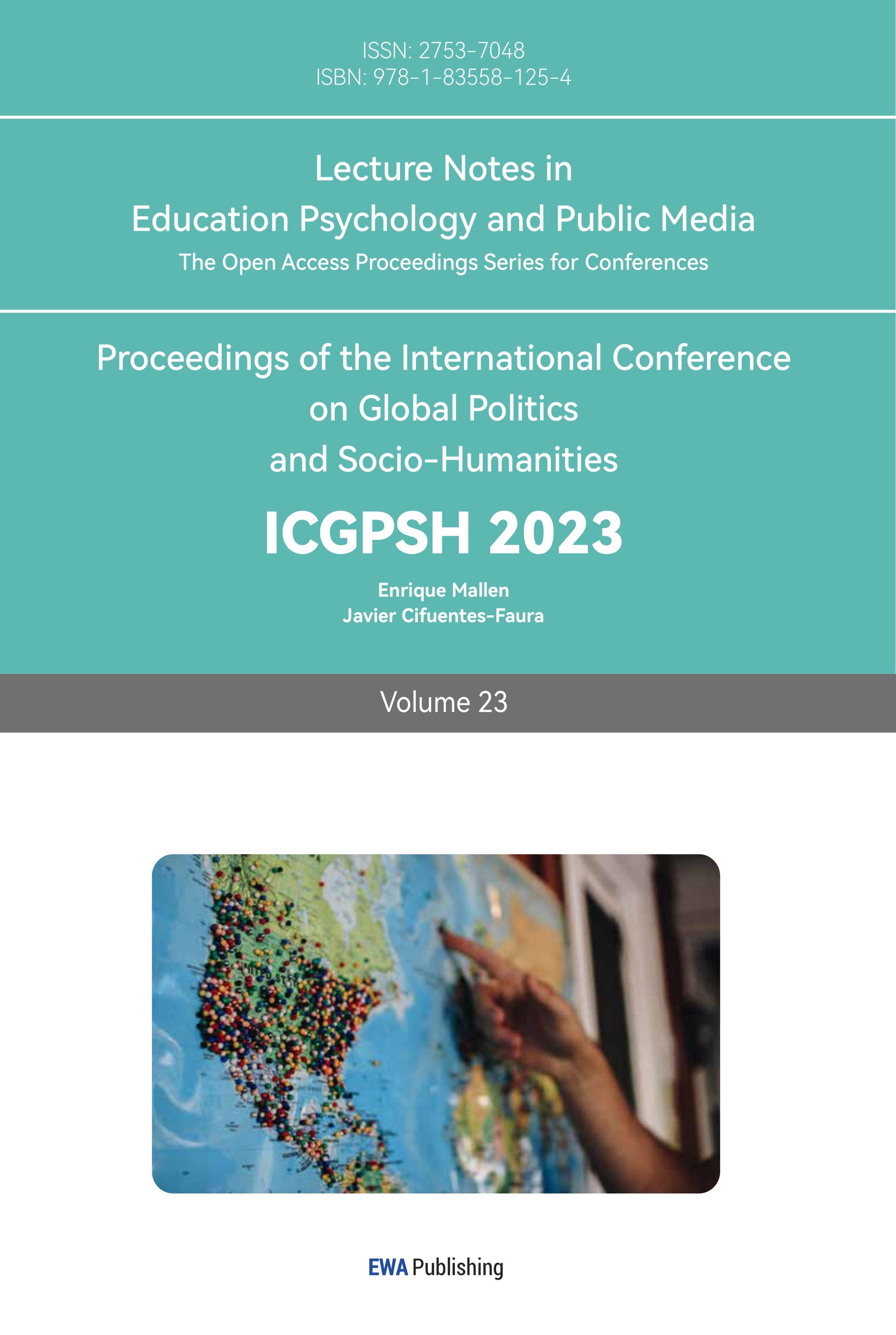References
[1]. Magoon, A. J. (1977). Constructivist approaches in educational research. Review of educational research, 47(4), 651-693.
[2]. Yip, F. W. L., Zelman, D., & Low, A. (2019). How to improve parenting in Hong Kong by training: The 6As positive parenting program. Public Administration and Policy, 22(1), 55-70.
[3]. King, R. B., Caleon, I. S., Tan, J. P., & Ye, S. (2016). Positive education in Asia. The Asia - Pacific Education Researcher, 25(3), 361-365.
[4]. Waters, L. (2011). A review of school-based positive psychology interventions. The Australian Educational and Developmental Psychologist, 28(2), 75–90.
[5]. Chan, D. W. (2006). Emotional intelligence and components of burnout among Chinese secondary school teachers in Hong Kong. Teaching and teacher education, 22(8), 1042-1054.
[6]. Khine, M., & Areepattamannil, S. (2019). Steam education. Springer, 10, 978-3.
[7]. Compton, W. C. (2005). Introduction to Positive Psychology. Thomson Wadsworth.
[8]. Kwan, Y. W. (2020). Psychometric properties of a Chinese version of the constructivist learning environment survey among secondary school students in Hong Kong. Learning Environments Research, 23(2), 167–184.
[9]. Chen, C. W. J., & Lo, K. M. J. (2019). From teacher-designer to student-researcher: A study of attitude change regarding creativity in STEAM education using Makey as a platform for human-centered design instrument. Journal for STEM Education Research, 2, 75-91.
[10]. Brunzell, T., Stokes, H., & Waters, L. (2016). Trauma-informed positive education: Using positive psychology to strengthen vulnerable students. Contemporary School Psychology, 20(1), 63-83.
Cite this article
YUEN,H.C. (2023). Fostering Holistic Development: Exploring the Integration of Positive Psychology, Constructivist Teaching, and STEAM Education in Hong Kong Secondary Schools. Lecture Notes in Education Psychology and Public Media,23,324-328.
Data availability
The datasets used and/or analyzed during the current study will be available from the authors upon reasonable request.
Disclaimer/Publisher's Note
The statements, opinions and data contained in all publications are solely those of the individual author(s) and contributor(s) and not of EWA Publishing and/or the editor(s). EWA Publishing and/or the editor(s) disclaim responsibility for any injury to people or property resulting from any ideas, methods, instructions or products referred to in the content.
About volume
Volume title: Proceedings of the International Conference on Global Politics and Socio-Humanities
© 2024 by the author(s). Licensee EWA Publishing, Oxford, UK. This article is an open access article distributed under the terms and
conditions of the Creative Commons Attribution (CC BY) license. Authors who
publish this series agree to the following terms:
1. Authors retain copyright and grant the series right of first publication with the work simultaneously licensed under a Creative Commons
Attribution License that allows others to share the work with an acknowledgment of the work's authorship and initial publication in this
series.
2. Authors are able to enter into separate, additional contractual arrangements for the non-exclusive distribution of the series's published
version of the work (e.g., post it to an institutional repository or publish it in a book), with an acknowledgment of its initial
publication in this series.
3. Authors are permitted and encouraged to post their work online (e.g., in institutional repositories or on their website) prior to and
during the submission process, as it can lead to productive exchanges, as well as earlier and greater citation of published work (See
Open access policy for details).
References
[1]. Magoon, A. J. (1977). Constructivist approaches in educational research. Review of educational research, 47(4), 651-693.
[2]. Yip, F. W. L., Zelman, D., & Low, A. (2019). How to improve parenting in Hong Kong by training: The 6As positive parenting program. Public Administration and Policy, 22(1), 55-70.
[3]. King, R. B., Caleon, I. S., Tan, J. P., & Ye, S. (2016). Positive education in Asia. The Asia - Pacific Education Researcher, 25(3), 361-365.
[4]. Waters, L. (2011). A review of school-based positive psychology interventions. The Australian Educational and Developmental Psychologist, 28(2), 75–90.
[5]. Chan, D. W. (2006). Emotional intelligence and components of burnout among Chinese secondary school teachers in Hong Kong. Teaching and teacher education, 22(8), 1042-1054.
[6]. Khine, M., & Areepattamannil, S. (2019). Steam education. Springer, 10, 978-3.
[7]. Compton, W. C. (2005). Introduction to Positive Psychology. Thomson Wadsworth.
[8]. Kwan, Y. W. (2020). Psychometric properties of a Chinese version of the constructivist learning environment survey among secondary school students in Hong Kong. Learning Environments Research, 23(2), 167–184.
[9]. Chen, C. W. J., & Lo, K. M. J. (2019). From teacher-designer to student-researcher: A study of attitude change regarding creativity in STEAM education using Makey as a platform for human-centered design instrument. Journal for STEM Education Research, 2, 75-91.
[10]. Brunzell, T., Stokes, H., & Waters, L. (2016). Trauma-informed positive education: Using positive psychology to strengthen vulnerable students. Contemporary School Psychology, 20(1), 63-83.









